Building an API Hub with Spring Boot, Kotlin and Orbital
- Date
 Marty Pitt
Marty Pitt
Spring Boot is an awesome framework for building Microservices, and Orbital is an amazing platform for connecting those microservices together.
Orbital works by reading the specs of microservices, (eg., OpenApi, Raml, Protobuf or Taxi) and building a large mesh of APIs.
All this schema metadata is browsable in Orbital’s UI, and can be an awesome hub for developers to discover and document their APIs - even without using Orbital’s integration capabilities.
In this blog post, we’re going to explore creating an awesome self-updating developer hub using Spring Boot, Kotlin, and Orbital’s API catalog.
Our microservices will publish their APIs directly to Orbital on startup, so that Orbital is always up-to-date. There’s lots of different ways to publish API specs to Orbital - but in this post we’ll focus on a code-first workflow.
What we'll get
At the end of this post, we’ll end up with a local instance of Orbital, with a couple of Spring Boot microservices that self-publish their API’s.
We’ll get beautiful diagrams like this, which show the running services, as well as how the data between them is related:
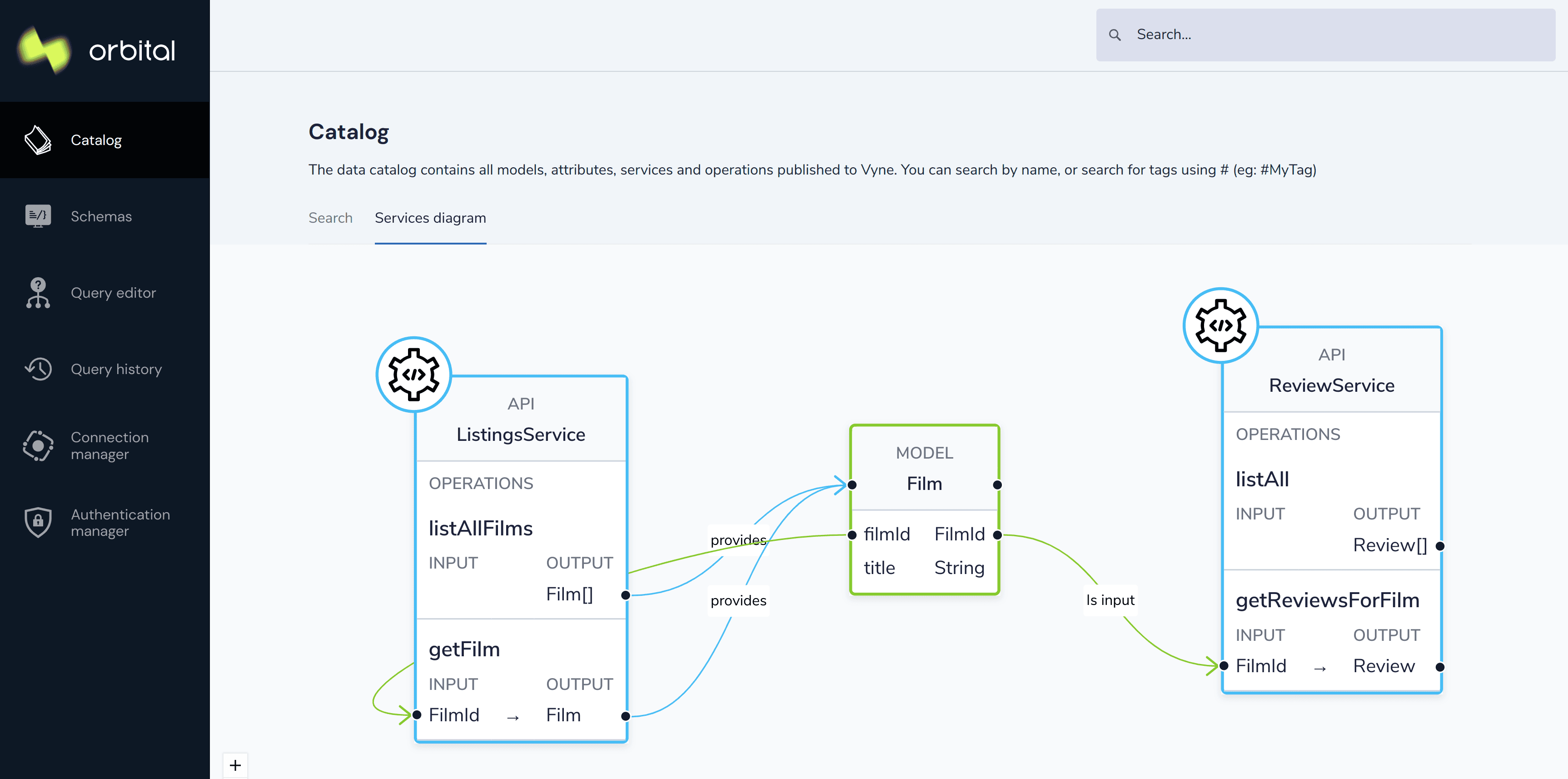
In addition, Orbital gives us a rich data and API catalog, where we can search and play with APIs:
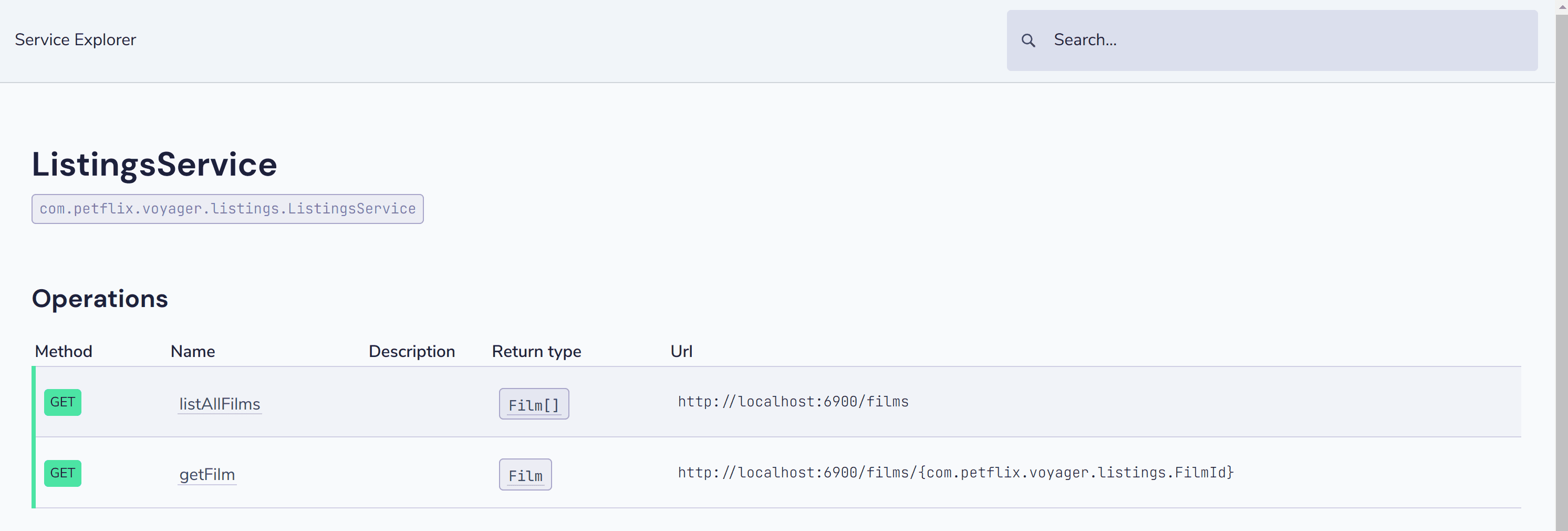
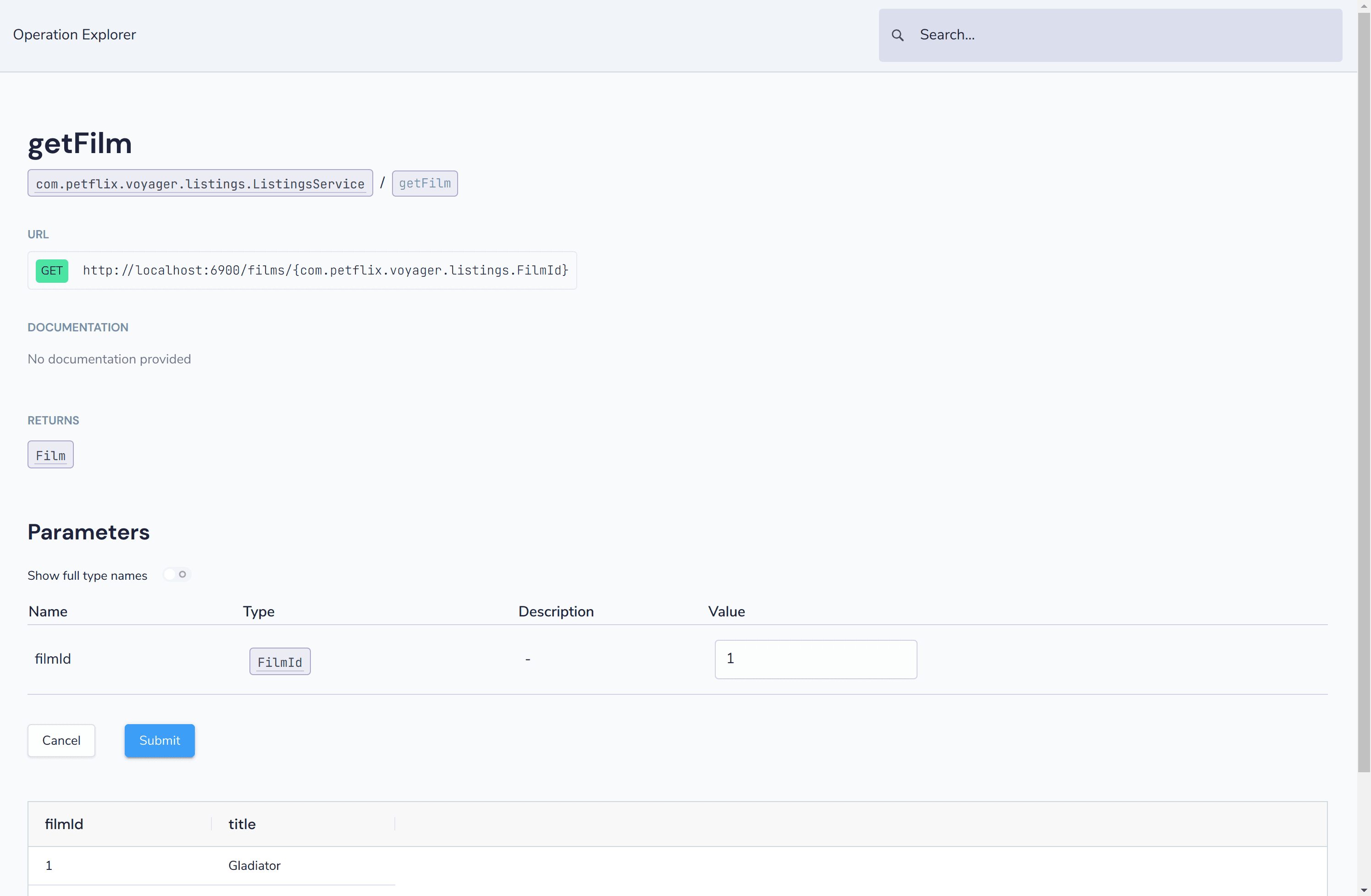
The Spring Boot app
We’ll start out with a vanilla Spring Boot app:
package com.petflix.voyager.listings
import org.springframework.beans.factory.annotation.Autowired
import org.springframework.beans.factory.annotation.Value
import org.springframework.boot.SpringApplication
import org.springframework.boot.autoconfigure.SpringBootApplication
import org.springframework.boot.info.GitProperties
import org.springframework.context.annotation.Bean
import org.springframework.context.annotation.Configuration
import org.springframework.stereotype.Component
@SpringBootApplication
open class FilmListingsApp {
companion object {
val logger = LoggerFactory.getLogger(this::class.java)
@JvmStatic
fun main(args: Array<String>) {
SpringApplication.run(FilmListingsApp::class.java, *args)
}
}
}
Heads up...
To keep this example simple, we're deploying a single Spring boot application with multiple API endpoints, each simulating a different microservice.
In practice, each of these controllers would be seperate microservices and Spring Boot applications. We'll leave that as an exercise for the reader. You got this.
This consists of:
- A maven
pom.xmlfile, declaring our vanilla Spring Boot dependencies, and a JPA database FilmListingsApp.kt- The spring boot app class fileFilmListings.kt- A Spring Data repository and controller for listing filmsReviews.kt- A Spring Data repository and controller for listing reviews of our films
Since these are all pretty standard, we won’t go into them in more detail here
Starting Orbital
To get Orbital running, grab the docker compose from start.orbitalhq.com and start Orbital running
curl https://start.orbitalhq.com > docker-compose.yml
docker-compose up -dIf you head over to http://localhost:9022 you should see Orbital running, and waiting for connections
Publishing our schemas
Next up, let’s get our Spring Boot applications publishing their schemas.
When the apps start, they’ll create a schema (using Taxi), and publish them up.
Note - you don’t have to use Taxi here - if you already have an OpenAPI spec you can use that, by following the [docs](/docs/describing - data - sources / open - api).
First, we’ll add some dependencies to our Maven:
<properties>
<taxi.version>1.36.2</taxi.version>
<orbital.version>0.22.0</taxi.version>
</properties>
<dependencies>
<!-- others omitted -->
<!-- A publisher, which will push our service schema
to Orbital on startup -->
<dependency>
<groupId>com.orbitalhq</groupId>
<artifactId>schema-rsocket-publisher</artifactId>
<version>${orbital.version}</version>
</dependency>
<!-- The taxi codegen, which generates schemas for a spring boot app -->
<dependency>
<groupId>org.taxilang</groupId>
<artifactId>java-spring-taxi</artifactId>
<version>${taxi.version}</version>
</dependency>
</dependencies>
<!-- Also, add the Orbital maven repository -->
<repositories>
<repository>
<id>orbital</id>
<url>https://repo.orbitalhq.com/release</url>
</repository>
<repositories>Now, add a Kotlin class with the following code:
import com.orbitalhq.PackageMetadata
import com.orbitalhq.schema.publisher.SchemaPublisherService
import com.orbitalhq.schema.publisher.rsocket.RSocketSchemaPublisherTransport
import com.orbitalhq.schema.rsocket.TcpAddress
import lang.taxi.generators.java.spring.SpringTaxiGenerator
/**
* Create a task, which runs on startup, generating & publishing our schema
*/
@Component
class RegisterSchemaTask(
@Value("\$\{spring.application.name}") appName: String,
@Value("\$\{server.port}") private val serverPort: String
) {
init {
/**
* Declare a publisher, which will connect to the local running Orbital,
* and publish the generated schema
*/
val publisher = SchemaPublisherService(
appName,
RSocketSchemaPublisherTransport(
// Orbital accepts schema submissions over
// RSocket using port 7655
TcpAddress("localhost", 7655)
)
)
publisher.publish(
// Package metadata identifies this project.
// Kinda like maven poms, or npm package.json
// This can be whatever you want, but make it unique to this service
PackageMetadata.from(
organisation = "io.petflix.demos",
name = "films-listings"
),
// The generator creates Taxi schemas.
// The base url should be the url of this application.
// All published URLs are relative to this url
SpringTaxiGenerator.forBaseUrl("http://localhost:${serverPort}")
.forPackage(FilmListingsApp::class.java)
.generate()
).subscribe()
}
}
That’s it! Now, restart your application.
Exploring our catalog
Inside Orbital, Click on the Catalog tab, and then the Services Diagram tab.
You should now see a diagram, showing our two API’s.
Clicking on any of the endpoints will also add the response schema to the diagram.
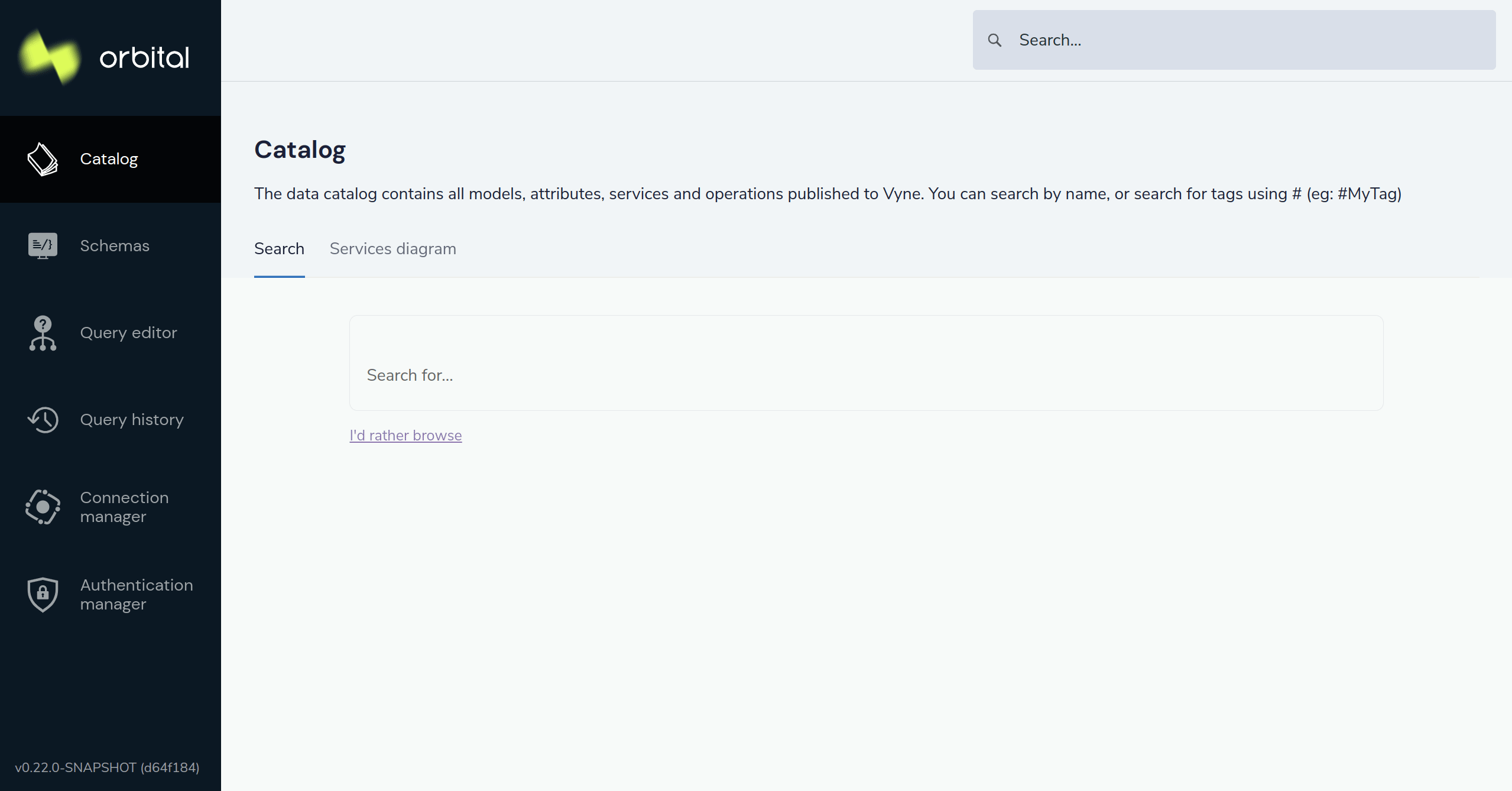
Our catalog also already has rich information about our services - including an API browser, and data catalog.
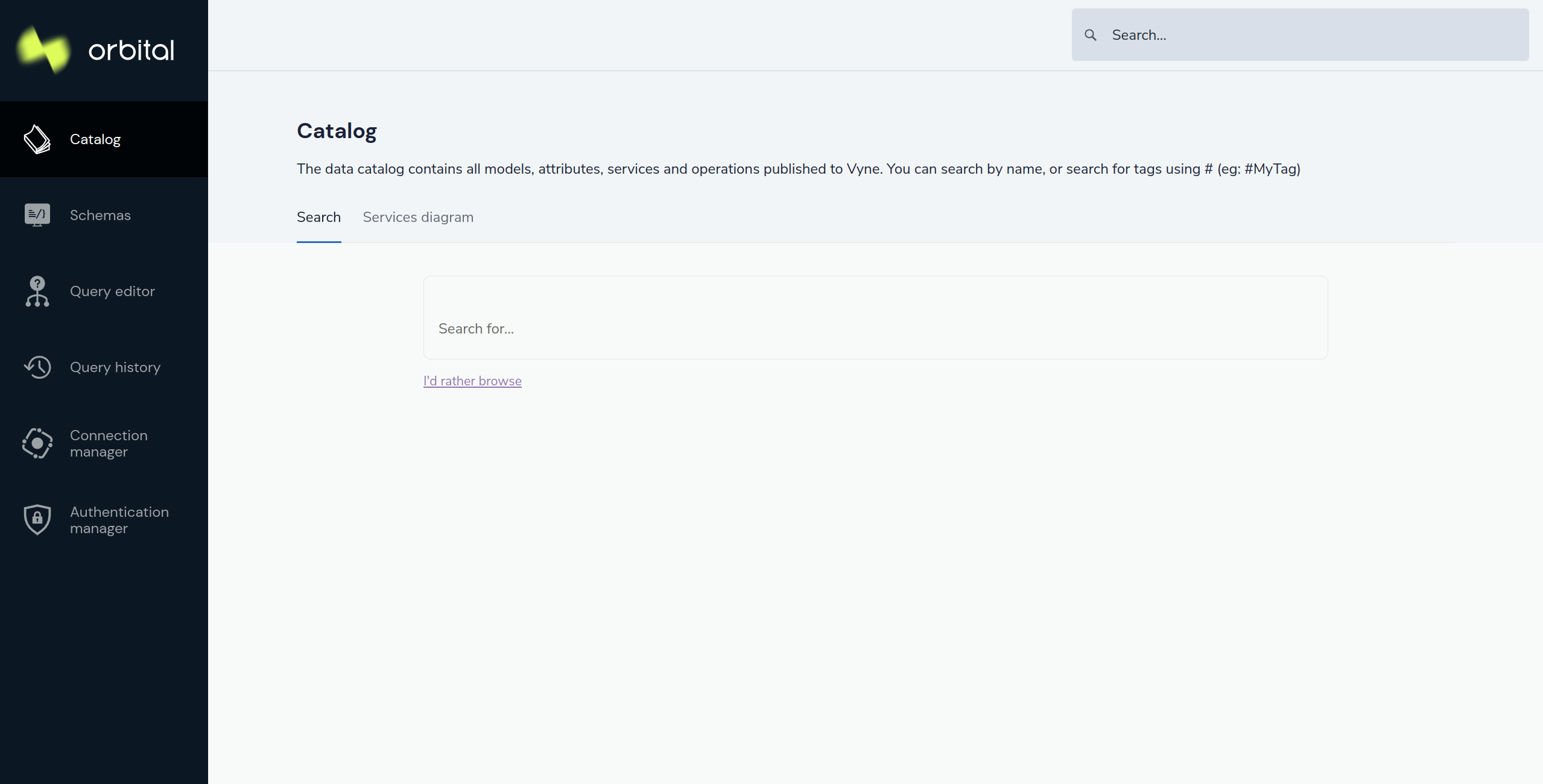
Going further - Exposing links between our APIs
So far, we have a pretty rich catalog, from just a few lines of code.
However, there’s important relationships here that we’re not exposing.
The Id from the Films can be passed to my Review service to lookup a review.This is key information for developers who are trying to navigate between services to Get Stuff Done.
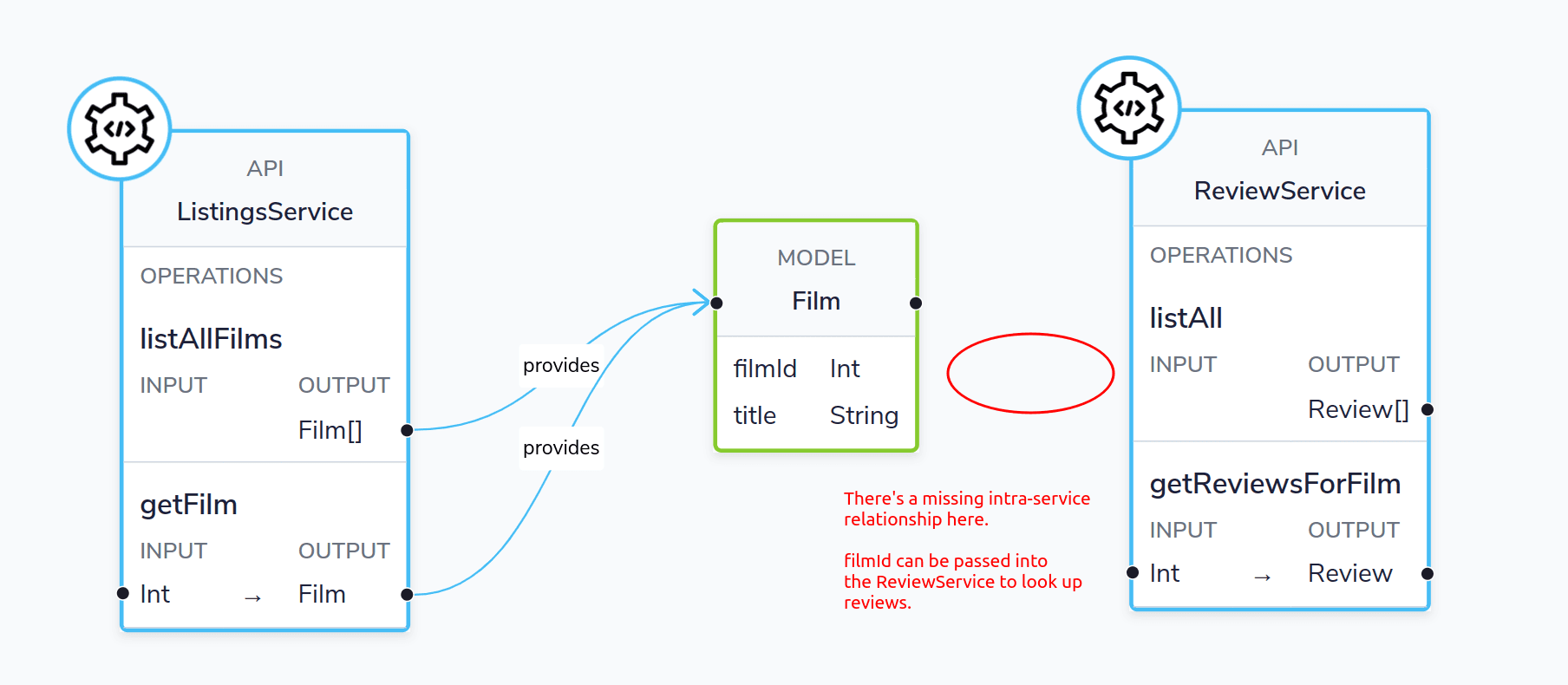
However, we’re in luck.
The schema that was generated is actually built using Taxi - an open source schema language that focuses on describing the semantic relationship of data between services.
Taxi has amazing support for Kotlin, and lets us use Kotlin’s typealias to express that the data
is related.
First, let’s define a type alias:
import lang.taxi.annotations.DataType
// The DataType annotation from
@DataType
typealias FilmId = IntThen update our code to use this.
There’s a few places we can change:
// Update the response object our API returns
@Entity
data class Film(
@Id
val filmId: Int,
val filmId: FilmId,
val title: String
)
// Update the input into our Review service
fun getReviewsForFilm(
@PathVariable("filmId") filmId: Int
@PathVariable("filmId") filmId: FilmId
): Review {
return repo.findAllByFilmId(filmId)
}
Now, if restart the Spring Boot app, our updated schema will get published directly to Orbital.
Refreshing the services diagram now shows an updated diagram with the relationship mapped:
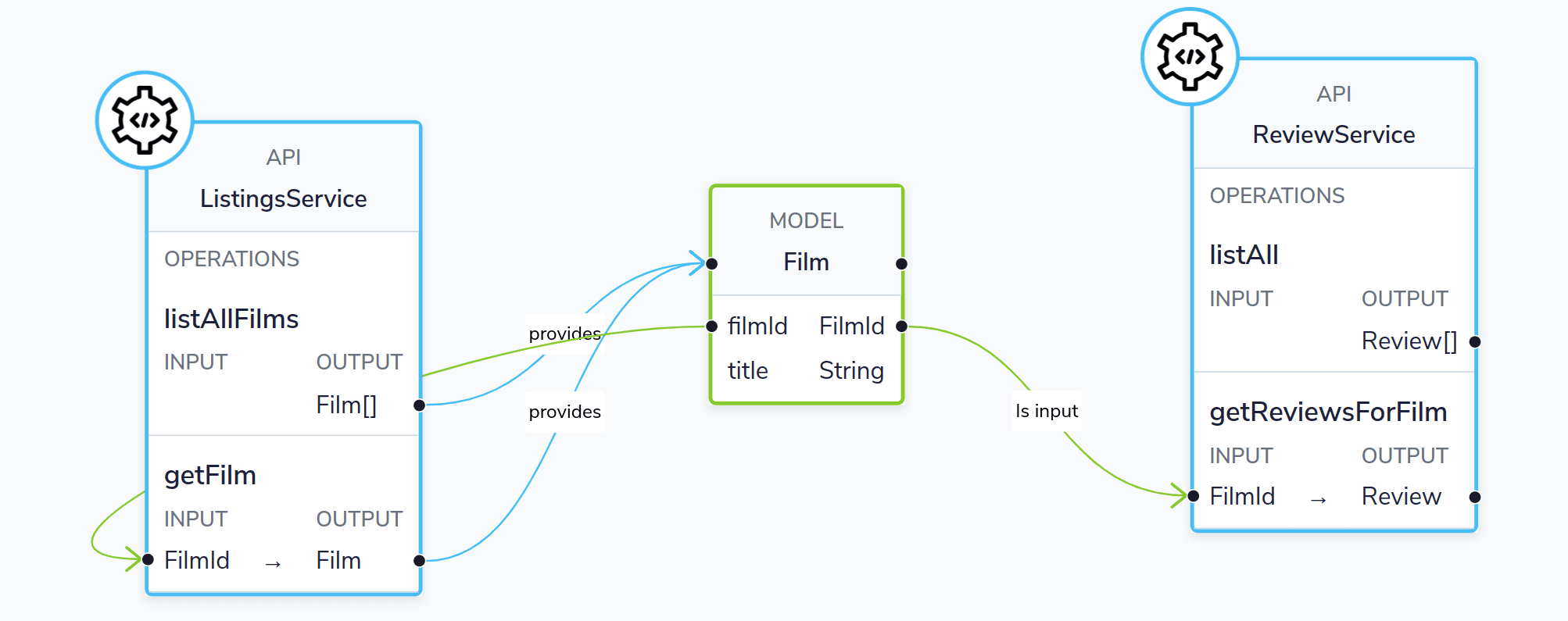
Changelog
We just pushed a change to our schema.While this one was fairly harmless(changing an input type fromInt totypealias FilmId = Int),
it’s useful to know when changes occur.
Orbital has a full changelog, every time a change is pushed.
Navigate over to the Schemas tab, and see the changelog entry
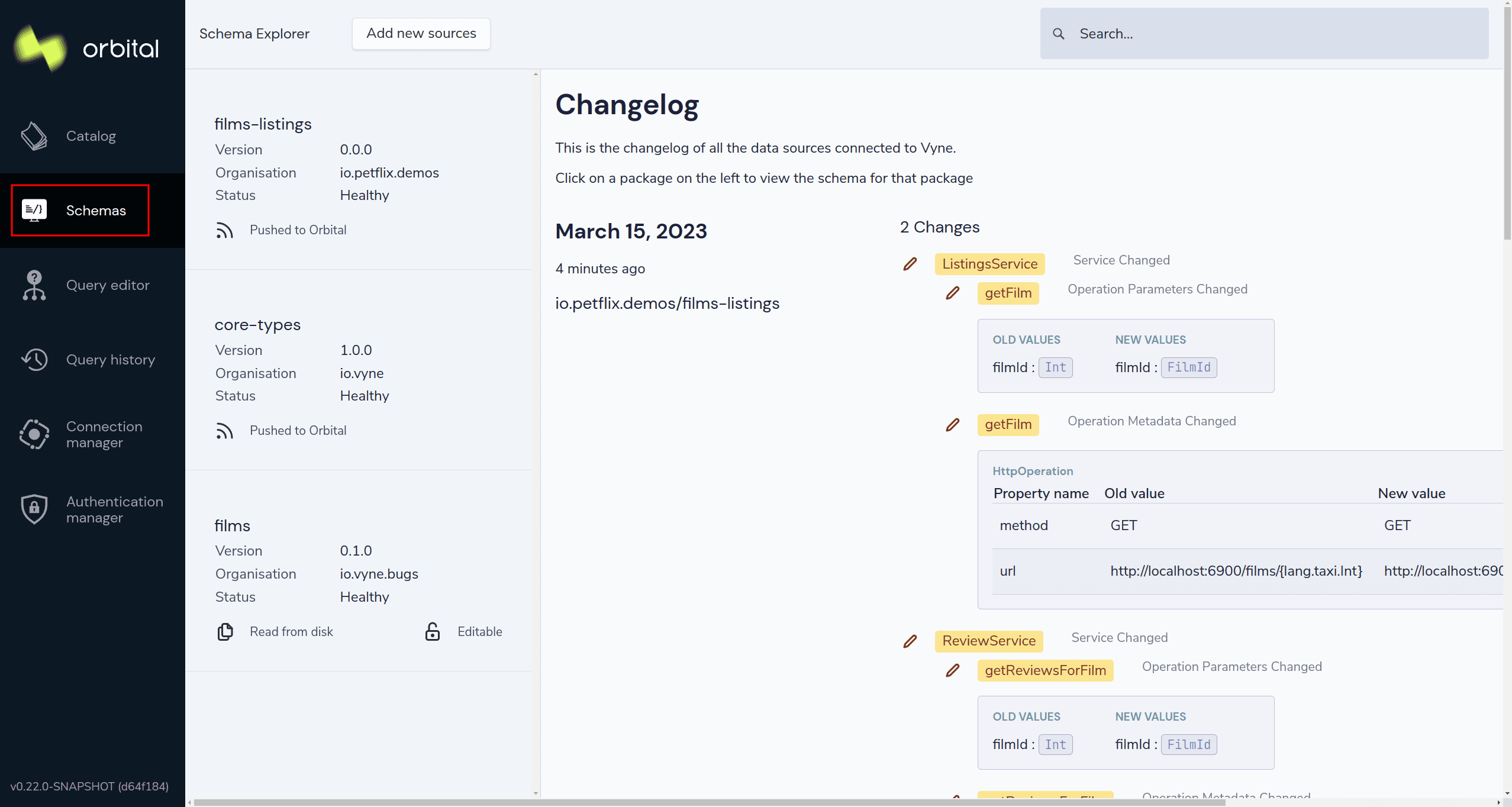
Summary
That’s a lot of catalog, for only a few lines of change.
To recap - the only change we needed to make to our Spring Boot application was adding our schema publisher - about a dozen lines of simple code.
Of course, we can go much further— Orbital’s real power is using the data in these schemas to automate integration between services.Check out our [Kotlin SDK](/blog/2023 - 03 - 06 - hello - kotlin - sdk) for more information!
As always, if you have any questions, come chat to us on Slack, or reach out on Twitter(either me, or our team)